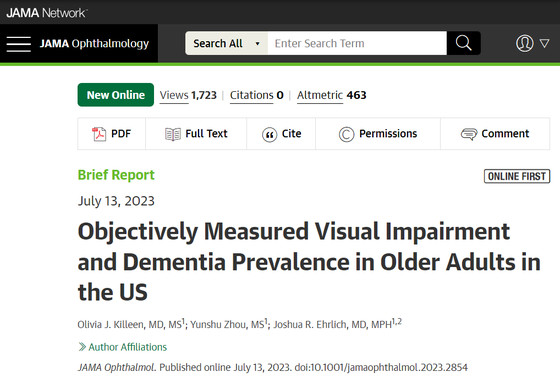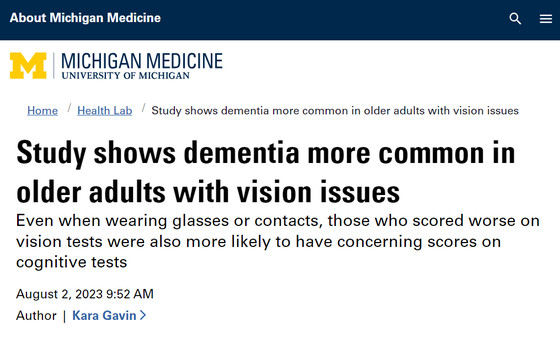A survey of more than 3,000 elderly people shows the tendency that 'the risk of suffering from dementia increases when vision decreases'

Of the five human senses, vision is said to have a particularly large effect on cognition, and it has been pointed out that losing the ability to see things clearly adversely affects thinking and memory. A research paper investigating the vision and cognitive abilities of about 3,000 elderly people in the United States was published, and it was shown that the risk of suffering from dementia tends to increase when vision decreases.
Objectively Measured Visual Impairment and Dementia Prevalence in Older Adults in the US | Ophthalmology | JAMA Ophthalmology | JAMA Network
https://doi.org/10.1001/jamaophthalmol.2023.2854

Study shows dementia more common in older adults with vision issues | Michigan Medicine
https://www.michiganmedicine.org/health-lab/study-shows-dementia-more-common-older-adults-vision-issues

The study was published by the Kellogg Eye Center of the University of Michigan School of Medicine, an academic medical center at the University of Michigan. All study subjects were over the age of 71, with an average age of 77. Subjects were tested for near and far vision, ability to read text with low contrast against a background, memory and thinking skills. They were also instructed to provide health information, including a diagnosis of cognitive impairment, including Alzheimer's disease.
The study found that just over 12% of all subjects had dementia. However, when limited to the group with problems with near-sightedness, the percentage of people suffering from dementia reached nearly 22%. In addition, 19% of those with mild distance vision problems and 33% of those with moderate or severe problems had signs of dementia. People with moderate or severe lifelong vision in the distance were 72% more likely to develop dementia than those with normal vision.

At the same time, 26% of those who struggled to read text with low contrast against the background showed signs of dementia. People with multiple vision problems were 35% more likely to develop dementia than those with normal vision.
The study also noted that the incidence of dementia decreased over time in people who had cataract surgery and regained their vision. 'Prioritizing eye health can be key to optimizing both your overall health and well-being, not just your vision,' said study authors Olivia Killeen and Joshua Ehrlich, ophthalmologists. Further trials are needed to confirm that vision optimization is a viable strategy for slowing cognitive decline and reducing dementia risk.'

'Access to care services to prevent, treat, or at least halt the progression of blindness is a potential impact on dementia,' said Sheila West, a researcher at the Wilmer Eye Institute at Johns Hopkins University. is a worthwhile goal separately and may be particularly important for those experiencing cognitive decline.'
Related Posts:
in Science, Posted by log1i_yk







